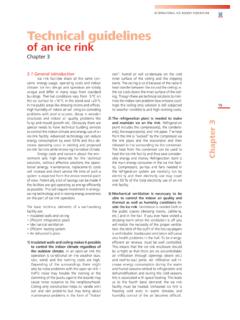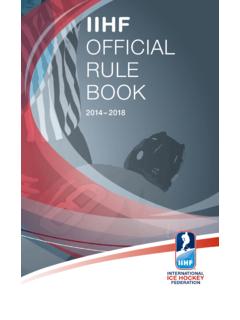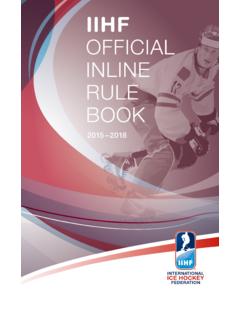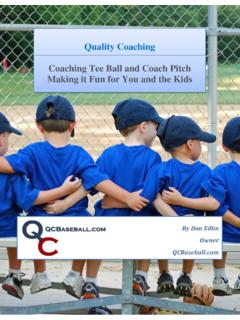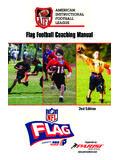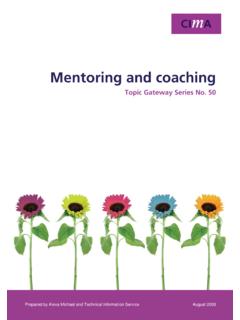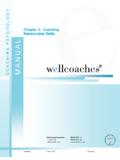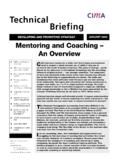Transcription of ROLE OF THE - International Ice Hockey Federation
1 September 2007 Page 1 LEADERSHIP LEVEL I role of the coach Page 2 September 2007 LEADERSHIP LEVEL I role of the coach In order to run a successful Hockey program, the coach must be prepared to fill various roles and accept many responsibilities. Coaching is much more than simply teaching the basic skills of Hockey . You do not usually realize how much there is to coaching until you become involved in it! If you have the commitment to be an effective coach , you will have he motivation to make the time to do all that is necessary to be effective at coaching. Chapter Overview: identify, and understand the specific roles of the coach as a; Leader, by appreciating the influence you have on athletes Teacher, realizing the importance of teaching athletes Organizer, by recognizing the value of an organized program The roles of the coach Coaches can have a great influence on their athletes.
2 The type and amount of influence you will have on your players is determined by your personal skills. You significantly affect your athletes motivation to achieve and the enjoyment they receive from participation in Hockey . Mutual respect for each other and the longer you are together with your players will increase the influence you have on them. The three major roles of the coach are: The coach as a Leader The coach as a Teacher The coach as an Organiser To have a positive and lasting impact on the athletes you coach , you need to be effective as a leader, teacher, and organiser; encourage and support your players; coach enthusiastically, and express genuine concern for the athletes total well-being. Your athletes decisions about long-term participation in Hockey are largely determined by the type of impact you have on them.
3 Your role becomes more important when you consider that the influence you have on your players extends well beyond the contact you have with them in the Hockey environment. September 2007 Page 3 LEADERSHIP LEVEL IThe coach as a Leader An important role of the coach is to be an effective leader. As a leader the coach must be able to: Establish Seasonal Goals and Objectives: Start by suggesting five or six general goals that you want your athletes to be able to achieve by the end of the season. These goals should reflect your league s philosophy, and should be consistent with the general goals. For example general goals could be: The players will be able to demonstrate 1) basic Hockey skills necessary to participate in practices and games at a level appropriate for their age, ability, and maturity; 2) sportsmanship in practices and games.
4 After having established the general goals, it is then necessary to more specifically define each goal, keeping in mind what your athletes will need to learn in order to achieve the goal. For example, under goal number 2, sportsmanship, there could be listed such objectives as; a) demonstrate respect for referees, opponents, teammates, coaches, and parents; b) use of appropriate language; c) control of emotions; and d) play by the rules. Other examples of specific observable and measurable goals could include the following: a) to be able to skate well both forwards and backwards; b) to be able to change from forward skating to backward skating and vice-versa; c) to increase the number of positive comments given to each other; and d) to reduce the number of penalties received in a game. The examples given illustrate that goals are set both in skill performance areas and behavioural areas.
5 Be sure to receive input and feedback from assistant coaches, players, and parents on the goals you have suggested. The players will show a greater commitment to achieving the goals if they participated in the setting of them. Set both short and long-term goals. The attainment of short-term goals provides feedback of improvement to the athletes and charts progress toward the attainment of an ultimate long-term goal. Also, remember that the goals you and your athletes set should be challenging but realistically attainable. Use a Democratic Coaching Style The goals you want your athletes to achieve are expressed through your coaching style and behaviours. Most coaches will indicate the following goals in the priorized order given: a) to assist athletes to develop physically ( , to learn basic Hockey skills), psychologically ( , to develop positive self-images), and socially ( , to learn to cooperate with each other in practices and games); b) to have fun; and c) to win.
6 How do you priorize the goals? How important is winning to you? Does your coaching behaviour reflect your priority of goals? If winning is the least important to you of the three goals, then be sure to behave in a manner which shows that the athletes development and having fun are more important than winning. Striving to win provides healthy competition, provided the proper significance is placed on the winning. To keep winning in the proper perspective will allow for the optimal development of your players while having fun. A democratic coaching style is most appropriate in achieving these goals. Coaches who use this style understand their responsibilities in providing leadership and direction to their athletes while allowing the athletes the opportunity to share in the decision-making and responsibilities. Page 4 September 2007 LEADERSHIP LEVEL IUsing a democratic coaching style does not mean that the athletes have input on all the decisions made.
7 It is necessary for you to provide an appropriate amount of structure and rules to allow for the optimal total development of your athletes. In so doing, you give direction and make decisions when it is necessary, but you also realize when it is more beneficial to let the athletes make the decisions and take the responsibilities. If you provide too much structure, an autocratic coaching style will become your dominant coaching style and will result in decreasing the satisfaction athletes could receive from their participation. Providing just the right amount of structure that is optimal for the athletes you coach is the objective of the democratic coaching style. Using a democratic coaching style will enhance your players abilities to make decisions and become responsible, independent adults. A democratic coach places more trust in the abilities of the players, which has a very positive effect on their self-images.
8 As well, this coaching style improves communication between the players and the coach and improves the motivation of the athletes to achieve and feel more personally satisfied with their participation. Provide an Appropriate Role Model from Whom Your Players can Learn You are a very significant role model for the athletes you coach . Set an example that is desirable for your players to follow. For example, demonstrate a healthy lifestyle with respect to physical fitness and the use of alcohol. Develop Leadership Abilities in Your Athletes Athletes deserve the right to share in the decision-making of their participation in Hockey . Along with the right to make decisions comes responsibility. Allow your players to take responsibilities for their participation. For example, let your athletes run parts of the warm-ups and design new drills.
9 Under your leadership, your players will develop into individuals who will accept themselves, others, and responsibilities. September 2007 Page 5 LEADERSHIP LEVEL I Establish a Positive Relationship with the On-Ice Officials You demonstrate leadership to your players by establishing a positive, respectful relationship with officials. The coach should be a model of sportsmanship toward referees. The coach s behaviour should demonstrate to the athletes the proper behaviour they should have toward the officials. As well, through the coach s behaviour the players should become aware of the necessary role of officials in Hockey to make the game fair and more enjoyable for the players. Deal Effectively with Well-Meaning but Difficult to Handle Parents Parents sometimes place unrealistic expectations on their children and the coach .
10 Remind parents that Hockey is only part of their children s lives and that it needs to be kept in the proper perspective. Parents need to be reminded that the game is for the players, not the parents. Be sure you explain to the parents the goals and objectives of your program and encourage them to provide positive support to the players in their striving to achieve the goals. Through meetings and discussions with parents, the coach should be able to effectively handle problems that arise with parents. Demonstrate a Sincere Interest in Helping Athletes to Maximize their Potential Your enthusiasm as a coach will encourage your players to improve their skills. Athletes deserve to have a qualified, sensitive leader who has a genuine concern for their development. The coach as a Teacher Being an effective teacher is an important role of the coach .

